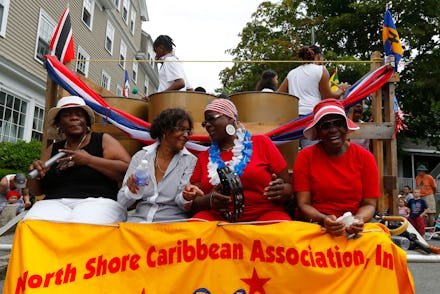No Better Time Than Independence Day to Reflect on Black Liberation

Growing up, there was nothing I loved more than holidays. I looked forward to days off and time away from school or work. I valued every opportunity I was granted to spend time with my extended family, especially when barbecued eats and hip-hop were involved.
Independence Day was particularly pleasant. It gave those of us in Camden, New Jersey, a chance to embrace the beauty and historical significance of a city the broader public often treated like a loveless hood.
We were dazzled by the luminous display of fireworks bursting over the Delaware River, which separates Camden from Philadelphia, and would momentarily forget the people we'd known who had been murdered months before. The live bands and performances on the redeveloped Camden waterfront provided a window into the best of our city's landscape, so different from the boarded-up and dilapidated homes often displayed in the local paper. We had to pass the county jail, a dreadful building near Walt Whitman's former home, as we walked from the main transportation hub to the river. We had created a specific type of sign language to communicate from the ground as incarcerated family members and friends signed back, to let us know how much they missed us from behind caged windows.
The celebration of Independence Day in Camden exposed me to the absurd contradiction that characterizes American life as experienced by most black and brown, economically disenfranchised people in the United States. We tend to disguise American dysfunction in a festive façade. But no amount of grand parades, free concerts, enticing barbecues or flashy firework displays can hide the harsh realities so many must face in a country whose independence was purchased at the expense of indigenous people's land and enslaved Africans' bodies.
Independence Day presents a conundrum, a reminder that the notion of liberty we celebrate to great effect has, for most of our history, been understood as only available to some.
We tend to disguise American dysfunction in festive façade.
This July Fourth follows the recent murder of nine black parishioners by a white supremacist, who shot them dead after they graciously welcomed him into their church. At least two black churches burned down over the past few weeks are being investigated as arson. Black people killed by police are still disproportionately unarmed compared to white victims. Our jails are still bloated with the bodies of black and brown people, who remain overly policed and criminalized by our justice system. On Saturday, a black woman named Bree Newsome was arrested after climbing a flagpole outside of the South Carolina Statehouse to remove the Confederate battle flag — her attempt to prevent the fate of a contested symbol of white racism from being determined by legislatures who don't fully understand why the flag offends black people in the South and elsewhere.
Maybe Independence Day should be our country's check-in day. It can be an occasion to gauge the extent to which we fully, or fail to, achieve the idealistic notions of "liberty," "justice" and "equality" that fuel its celebration. It can be our litmus test, a day to assess the acidity of our inequity. Given that it is a day that essentially honors our storied Revolutionary War heroes, it can also be our moment to consider our modern prejudices and resistance to black liberation, at a time when people across the country are loudly proclaiming that black lives matter.
I will be traveling home to Camden this weekend. There will be good food, merriment, cocktails and fireworks in a city where an estimated 82.4% of the 76,903 residents are not white and the per capita income is just $13,385.
Even amid of the temporary respite offered on Independence Day, I hope Americans will recognize the puzzling fact that we celebrate a freedom not yet fully realized in the lives of so many. I hope they will consider what we must do as a country to transform our merely symbolic idea of "liberty and justice for all" into a material fact inclusive of all Americans, especially those still burdened by the weight of injustice.